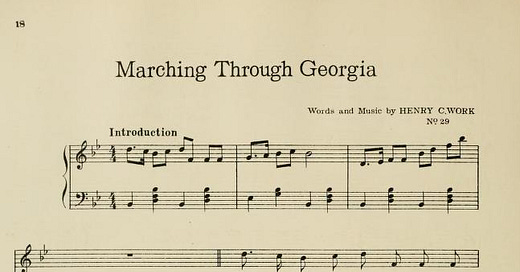
[Update, 6/1/24: I’ve revised a couple of paragraphs of the excerpt below. See my latest post for the revised text.]
In my last post, I shared my first stab at the beginning of chapter 1 of my biography-in-progress A Priest in Good Trouble: Father Louis J. Twomey, SJ’s Battle for Human Dignity with MLK in the Deep South. (If you’re new to Matters Twomey, you may wish to read my America article on Father LJT for a general overview of his life and work.)
Since writing that post five days ago, I’ve managed to make further progress on the chapter, including revising and adding to the excerpt I posted. So I’ve decided to delete that excerpt and post the latest version here.
One wonderful thing that’s happened since I began work chapter 1 is that I’ve found and interviewed two more people who knew Father Twomey. One of them, the veteran free-form radio DJ Tim Sweeney, whom I discovered via his website Sweeney’s Gumbo YaYa, shared a story that fit perfectly into this very chapter. (I should note that the story shared below, which involves a practical joke played by Tim’s father, Jim [James W.] Sweeney, isn’t representative of Jim or his friendship with Father Twomey, with whom he worked closely for a time. Jim was a great man, and he and Twomey warmly respected one another, as I’ll share later in the book. However, Jim did play a joke on his Jesuit friend at least once, and Twomey’s reaction revealed something important about himself.)
If you’re a paid subscriber, you’ll next see a dividing line, followed by the entire revised and extended excerpt of chapter 1 in progress. If you’re a free subscriber, you’ll see the dividing line and the first five paragraphs of chapter 1, followed by a paywall. Either way, I’m grateful that you’re here. Thank you.
It seemed impossible that a young man with Irish and Italian blood could be virtually tone deaf. Yet that was teenage Lou Twomey’s reality as he gathered with his high-school football teammate Ferdinand Fisher and other pals around a piano at a friend’s house one humid evening in Tampa, Florida, during the early 1920s.
A budding orator, Lou was skilled at moderating the rhythms and tone of his uncommonly deep speaking voice. He was physically agile as well, and could carry a football with enviable speed. But he couldn’t carry a tune in a bucket—not that he noticed or cared. He loved music and he loved being part of something larger than himself, whether it was his family, a sports team, a debating society, or the small army of acolytes that helped the Jesuits keep Sacred Heart Parish’s Masses running smoothly.
On this particular evening, that something larger was a party. When Ferdinand Fisher recounted that evening more than fifty years later, he could not recall who or what was being celebrated. But given that those present included students at the parish’s high school, Sacred Heart College, it would certainly have been a dainty affair organized by mothers who kept the teenagers under their watchful eyes while supplying copious amounts of candy, cake, and ice cream.
A songbook lay astride the piano’s music rack. As the gang finished singing one tune, Lou reached out a lanky arm to grasp the well-worn volume and started thumbing through it.
Suddenly, Lou’s face turned red. Incredulous, he exclaimed: “‘Marching Through Georgia’!”
Keep reading with a 7-day free trial
Subscribe to Matters Twomey to keep reading this post and get 7 days of free access to the full post archives.




